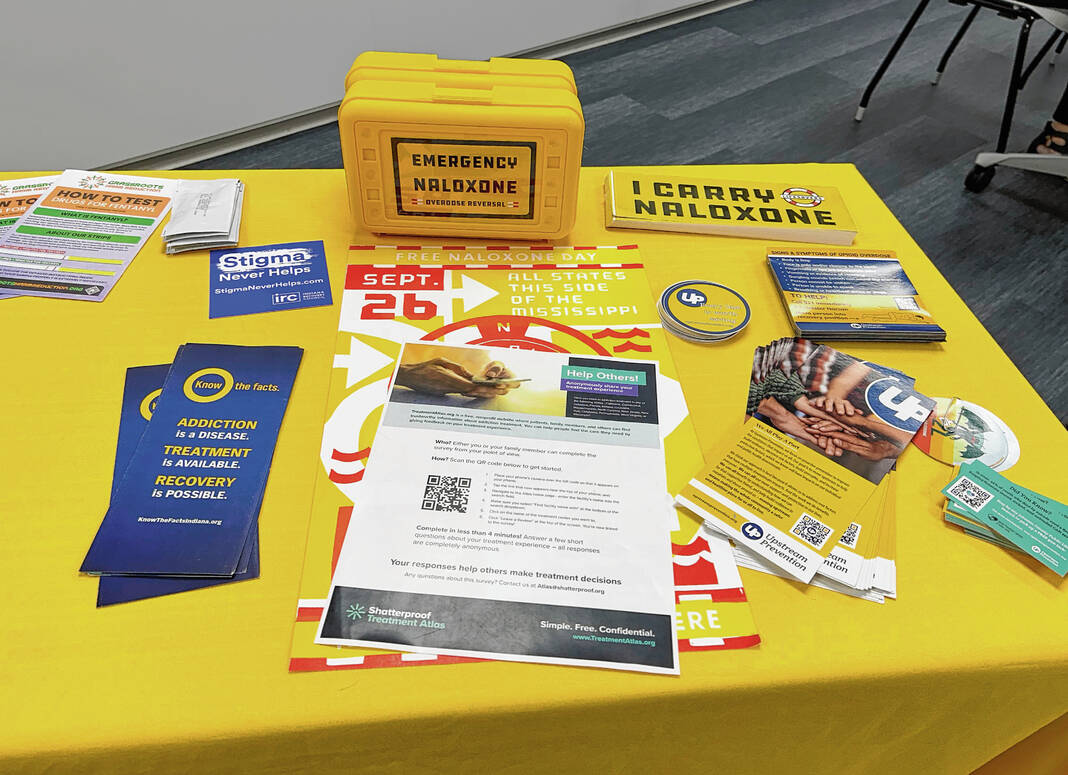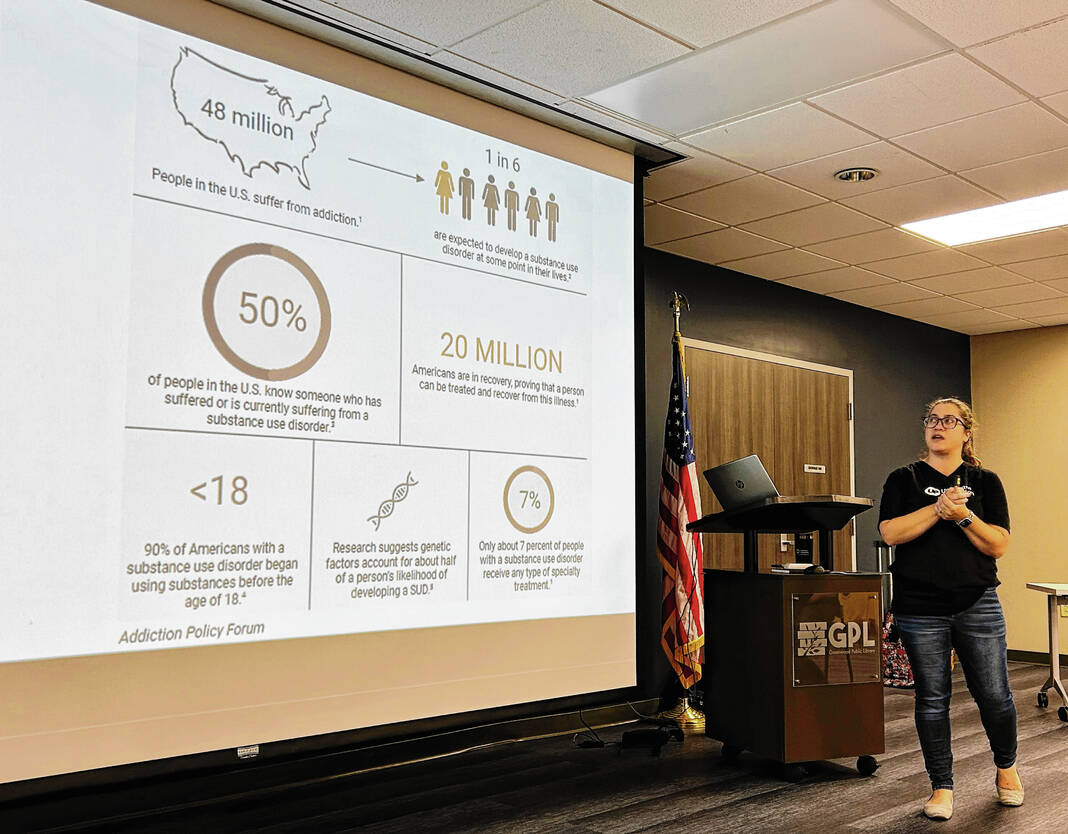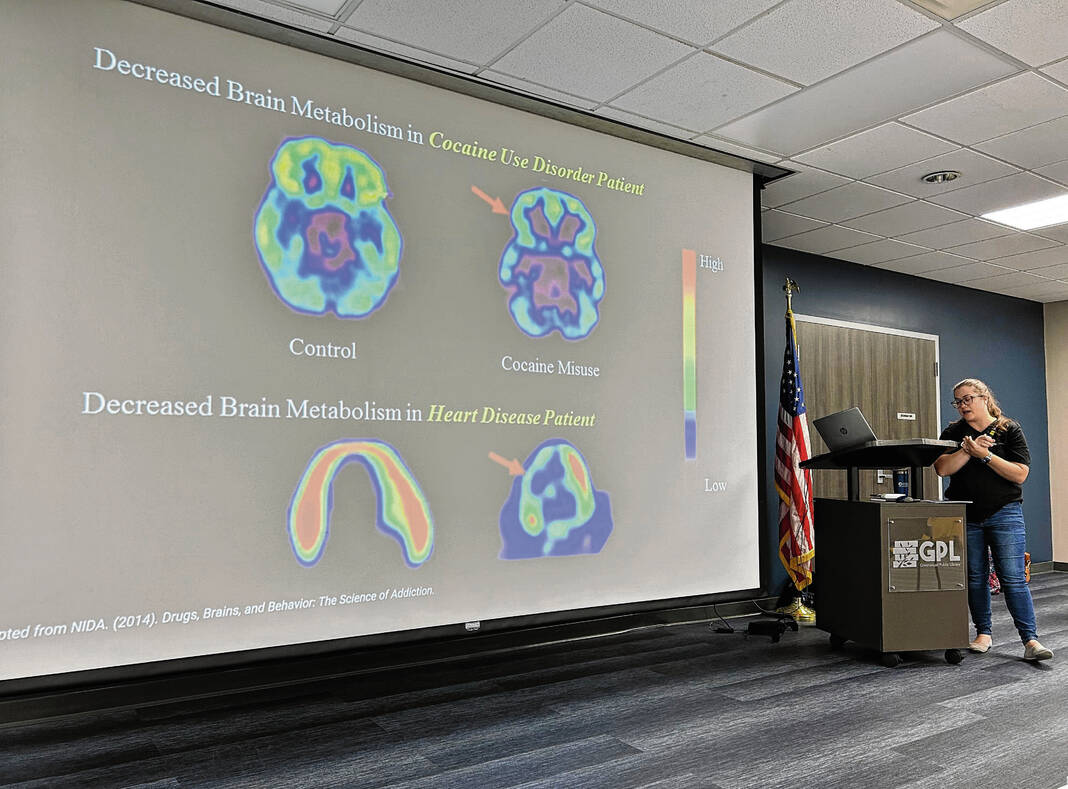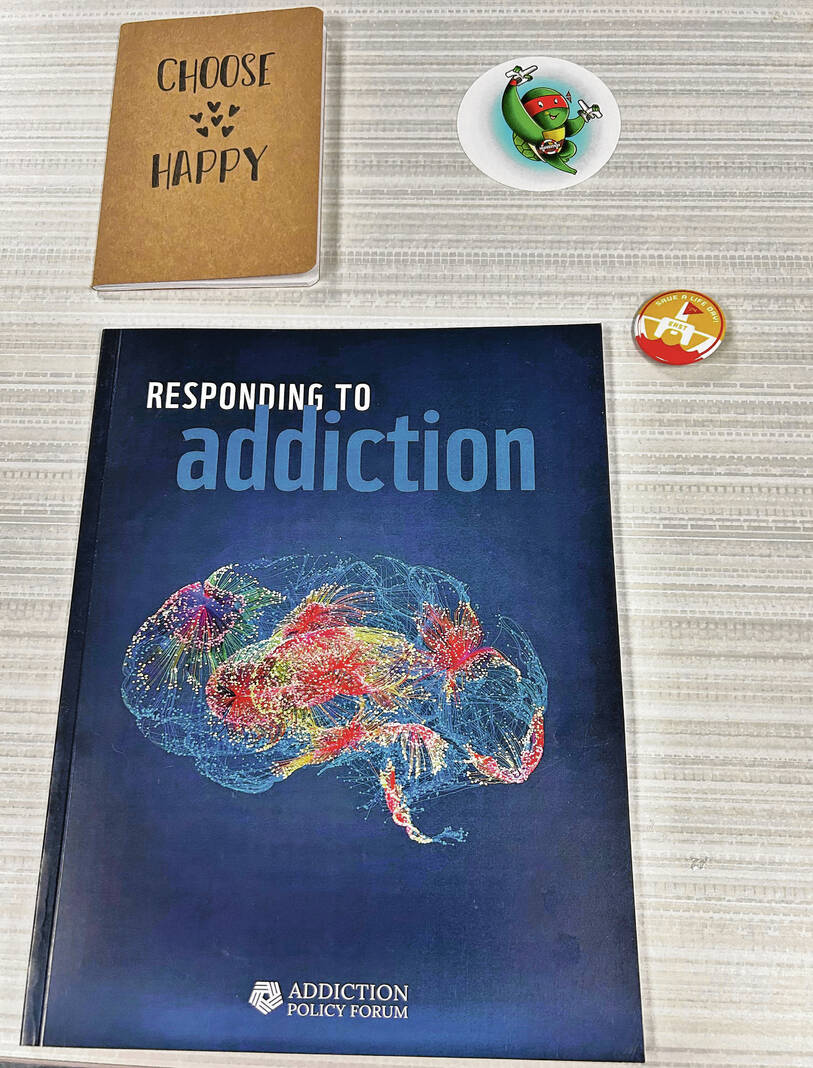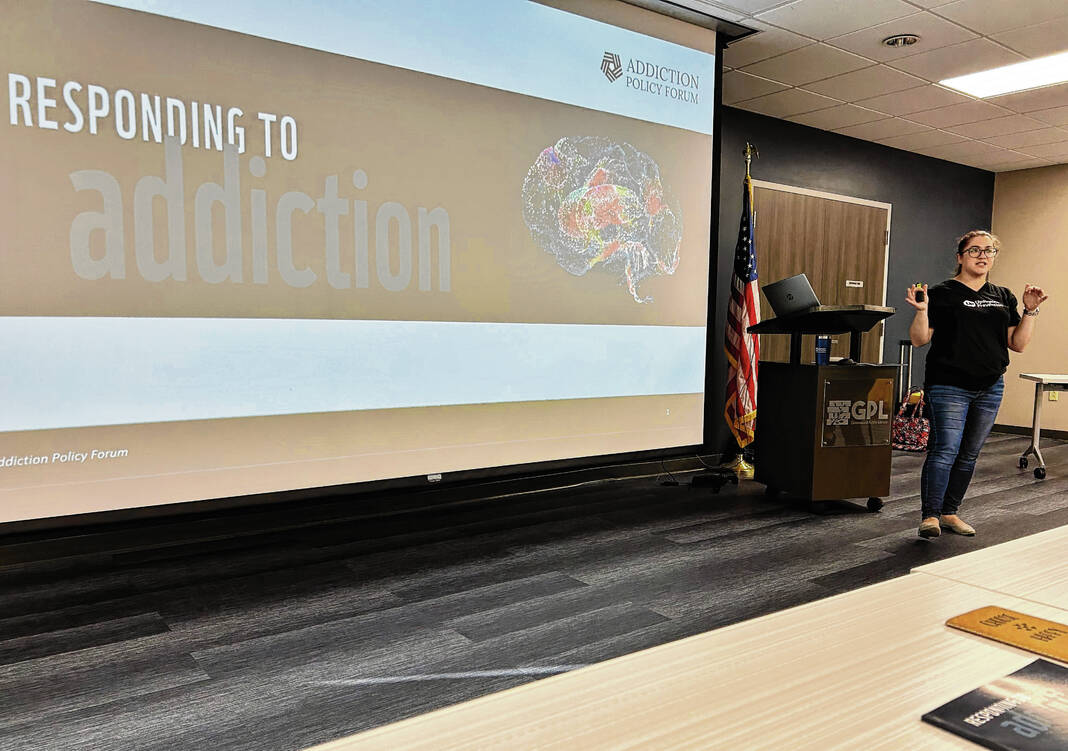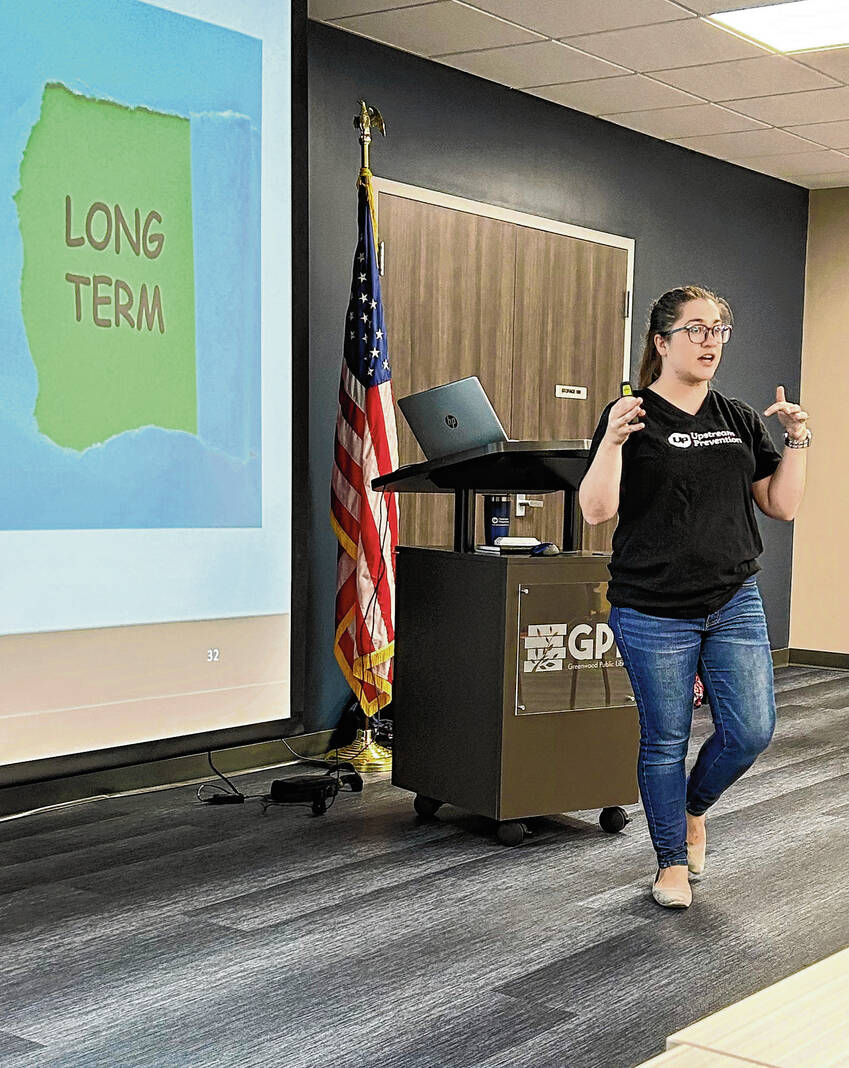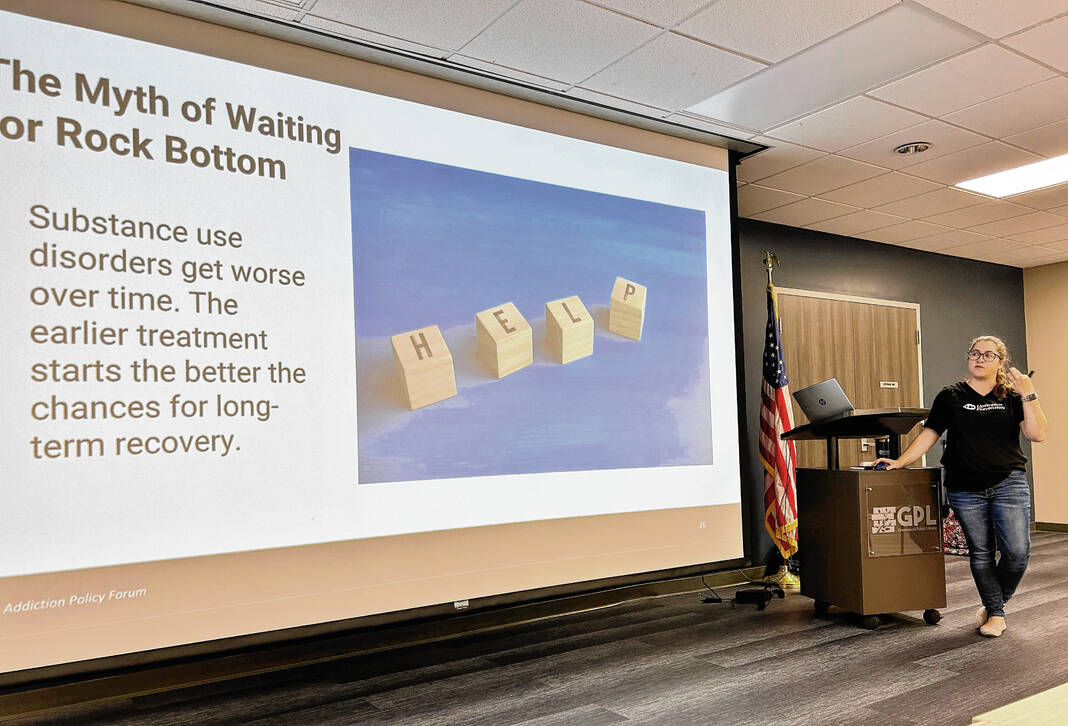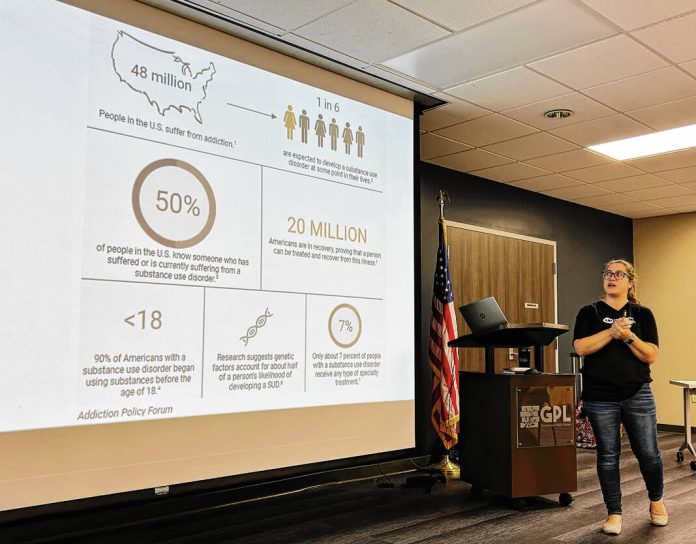
Kathleen Ratcliff, executive director for Upstream Prevention, discusses substance use disorder during the “Responding to Addiction” workshop Sept. 26 at the Greenwood Public Library. The goal of the workshop was to increase knowledge about addiction and help people develop skills and strategies to help in our own community.
RYAN TRARES | DAILY JOURNAL
Addiction was laid bare in unflinching terms.
Close to 20 people had come to the Greenwood Public Library to learn the impact, science and approach to substance use disorder. They saw how the disease affected millions of people across the United States. Graphics and videos explained how addiction alters the brain, and spotlighted the damage the stigma around addiction can have.
But at the same time, the group heard of the potential for recovery and how to support those who seek it.
“It’s important for us to realize that no child is unsaveable,” said Jessica Hulsey, founder of Addiction Policy Forum, in a video during the presentation.
For more than three hours on Sept. 26 — known as “Save a Live Day” — the group at GPL took a crash-course in addiction. “Recovery to Addiction” was a free workshop facilitated by Upstream Prevention, a local organization aimed at promoting public health within Johnson County.
The goal was to increase knowledge about addiction and help people develop skills and strategies to help in our own community, said Kathleen Ratcliff, executive director of Upstream Prevention.
“How we talk about addiction, how we talk about substance use disorder is important. And while there’s a good chunk of you who talk about this often in different ways than our co-workers or our family and friends, it’s still an important approach to think about what exactly we’re talking about and how to talk about it best,” she said.
“Responding to Addiction” was created by the Addiction Policy Forum, a nationwide nonprofit organization dedicated to eliminating addiction as a major health problem.
Through a variety of programs and resources, the groups activities include helping patients and families in crisis, end the stigma around addiction, expand prevention and early intervention, increase the uptake of evidence-based practice and advance patient-led research.
“As I’ve been doing this, and in the field at Addiction Policy Forum, we’ve really tried to simply and find all the things we wish everyone, both family members, community members, friends, co-workers, people in health care, the education field — all of us need more tools and skills to address addiction,” Hulsey said in a video during the workshop.
A major part of Upstream Prevention’s mission is focusing on behavioral health, including substance use disorder. The organization was accepted as an Anti-Stigma Pilot Site for the Addiction Policy Forum’s new training campaign.
“We’ve been looking for a strong training that increases education and awareness of substance use disorder, but specifically to address the stigma of addiction — doing what we can to move individuals from seeing addiction as a ‘moral failing’ and more to recognize it as a disease that impacts the brain and its functioning,” Ratcliff said.
“… If the community starts to realize and recognize it as a disease, we believe support, compassion, and resources will follow.”
Using funding from an Indiana Department of Health IN CARES ECHO grant, Upstream Prevention became the first in the area to offer “Responding to Addiction” in person. Participants were walked through a variety of different topics related to addiction.
Addiction is a complex disease with many different factors, severity levels and impacts. Across the U.S., 48 million people have substance use disorder — and 1 in 6 people are expected to develop it at some point in their lives.
Half of all people know someone who has suffered or are currently suffering from the disorder.
Despite the widespread frequency of addiction, many people don’t grasp that it is a disease.
“It’s been strange to me that people have such difficulty understanding that addiction is a disease, because a disease is basically described as damage done to an organ or system that basically jeopardizes your well-being. We now have evidence that certain circuits in the brain become dysfunctional when you are addicted to drugs,” said Dr. Nora Volkow, director of the National Institute on Drug Addiction, in a video during the workshop.
Participants learned about the risk factors for developing an addiction, including genetic predisposition, aspects of your environment that increase chances and individual choices.
Portions of the workshop dealt with the response to substance disorder, particularly as compared to how society responds to other diseases such as the flu.
“The approach we take to responding to a disease like the flu is the same response we’d want to take to addiction. It’s that same recognition of a disease. We want to reduce the number of people who develop a substance use disorder,” Ratcliff said.
Emphasizing the nature of the disease, the workshop delved into the science of addiction and how it impacts the brain — as well as how the brain can heal in recovery. Participants also learned about different ways to treat the disorder, from medication assisted recovery to counseling to support groups. All have value helping individuals into recovery.
“It’s not one thing or the other. We probably need a variety of these, and can benefit from mixing and matching these,” Ratcliff said.
People also learned about starting the conversation about recovery with someone struggling with addiction.
Much of the instruction, backed by reams of scientific research over the years, countered conventional concepts about addiction. In particular, the workshop pushed back against the idea that someone had to hit “rock bottom” before getting help.
“Substance use disorders get worse over time. The earlier we can have that intervention and treatment opportunity, the better chance we have for long-term recovery,” Ratcliff said.
Upstream Prevention plans to offer the workshop again in the spring and fall of 2025. Organizers hope it can not only educate people about addiction, but erode the stigma that exists around it.
“We hope the emphasis of substance use disorder as a disease that impacts the brain, reinforcement that treatment and recovery is possible, and that both should be tailored to the individual,” Ratcliff said.


